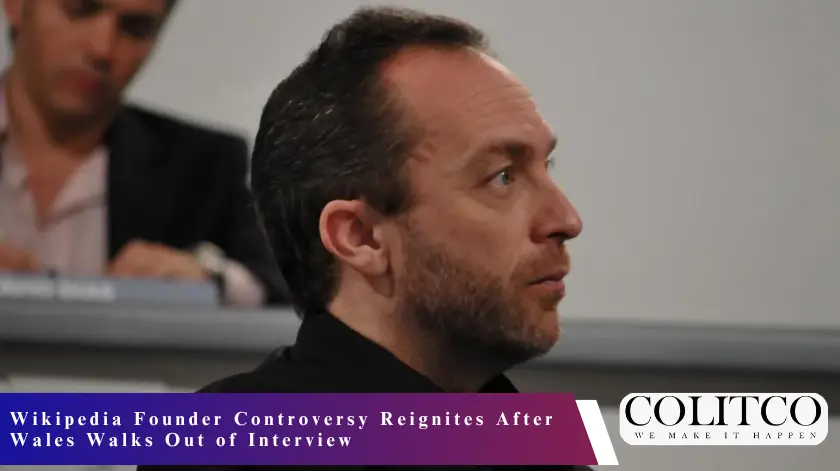A recent episode of the German podcast Jung & Naiv reignited the controversy surrounding the founder of Wikipedia. Jimmy Wales started the interview by presenting himself as “the founder of Wikipedia.” Tilo Jung, the host, immediately took him to task and asked whether he was really the founder or the co-founder. That seemingly simple question struck a nerve.

Wales bristled when questioned about being Wikipedia’s founder or co-founder.
Why Did Jimmy Wales Abruptly Leave?
Wales replied in a very direct and blunt way by calling the question “the dumbest question in the world” and arguing that it was not important. When Jung continued, implying that there might be a disagreement, Wales replied by saying there was none and that “say what you like … it doesn’t matter.” By the fourth time he repeated this, he got up, walked away, and left the interview in less than a minute. He remarked as he was leaving: “Don’t ask me stupid questions.”
How Long Has This Credit Dispute Been Going On?
This confrontation brings to light a long-standing tension. Wales and Sanger co-founded Wikipedia in 2001, but Sanger left shortly afterwards. Over the years, Wales has diminished Sanger’s contribution by even editing Wikipedia pages to alter or decrease the references made to him as a co-founder. Critics claim Wales has attempted to change the history of the past and present of Wikipedia to make himself the one and only founder.

Wales downplayed Sanger’s role, fuelling an ongoing dispute over Wikipedia’s origins.
What Does This Moment Reveal About Wales’s Legacy?
The walkout serves as a reminder of how sensitive Wales is about his legacy. His emotional reaction, though he publicly claims to see the “founder vs co-founder” argument as nothing but a petty one, suggests otherwise. The titles and the acknowledgement are not just an academic matter for Wales; they go deep into his identity and his role in the making of one of the world’s most powerful platforms.
This incident illustrates the frailties in tech history when it comes to collaboration: the credit of individuals and their contributions still lingers over the shared projects. For Wales, “the founder” is more than just a label; it is his personal brand.
Could This Affect How the Public Sees Wikipedia?
Might be so. The whole Wikipedia enterprise is based on the foundations of neutrality, teamwork, and open contribution. A public dispute over the credits for its creation may attract the same criticism of egos and power struggles among the leaders of the project.
Some people could interpret Wales’s non-participation as a defensive posture, while others might sympathise with him, viewing it as an expression of tiredness with the never-ending debate. The confrontation also serves as a reminder of the fact that the public still perceives very human stories of rivalry and legacy behind the ideal of a global knowledge repository.

A public credit feud risks exposing ego and power tensions within Wikipedia.
Is the Real Issue About Power, Recognition Or Something Deeper?
The whole matter may look like nothing more than a semantic quarrel at first glance: founder vs co-founder. However, in fact, the debate over the founder of Wikipedia is one about acknowledgement, power, and the writing of history. The communication shows that the issue of who was the “real” founder of Wikipedia still remains very personal and unresolved for Wales, and the same goes for the many who were involved in the building of the project, even after some decades.
Also Read: Elon Musk Unveils Grokipedia: AI-Powered Encyclopaedia Set to Challenge Wikipedia’s Reign
FAQs
Q1: Who was it that challenged Wales on his title during the interview?
The source of the question was Tilo Jung, the host of the Jung & Naiv podcast.
Q2: What was the duration of the interview with Jimmy Wales?
The whole conversation took about 48 seconds, and then Wales left.
Q3: Is Larry Sanger’s assertion that he is the co-founder of Wikipedia true?
Yes. He has repeatedly claimed that he was a co-founder of Wikipedia, especially in early conceptual and structural ways, which contributed to his co-founding the project.
Q4: Has Wales made an effort to change the way he is mentioned in Wikipedia?
Yes. He has, through editing, worked to create his own page and the pages of others that really highlight his role as the only founder while minimising the mention of Sanger as co-founder.





